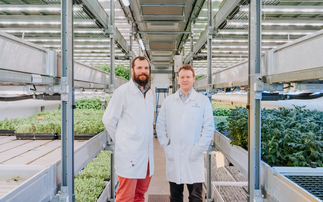The household brands giant explains the roots of its 'love affair' with the Amazon rainforest and its latest campaign from Conservation International
The links between SC Johnson and the Amazon rainforest are not immediately obvious. There are plenty of household brands under more immediate pressure to tackle deforestation in their supply chain than the global cleaning products giant. And yet it is the Wisconsin-based firm that recently launched a major forest protection and public awareness campaign in conjunction with Conservation International - a campaign that is set to save more than 10,000 acres of Brazilian rainforest from destruction.
However, a look at SC Johnson's corporate history reveals the ties between the company and the Amazon actually date back almost a century. Famously operating under the tag line "a family company", the privately-held firm is still controlled by the same family that founded it as a flooring business in 1886. It was the second Johnson to run the firm, Herbert F. Johnson Snr, who in 1935 bought a bi-plane and embarked on the 15,000 mile 'Carnauba Expedition' to Brazil in what amounted to one of the world's first ever sustainable supply chain audits.
"There is a love affair between a Wisconsin company in the cold climate of N America and Brazil," reflects Kelly M. Semrau, senior vice president for global corporate affairs, communication and sustainability, at the company. "It started in 1935 with one of the founding family members, HF Johnson. That time was fascinating; it was in the midst of the Great Depression, his father had just died, he had to run the business, he was getting a divorce, there were so many things going on, but he was an adventurer and an optimist. He bought a plane from the Shell oil company and he took off and went on a 15,000 mile round trip to South America, because he wanted to learn about one of the principle items that we used in every one of our products at that time - carnauba wax."
The trip was re-enacted in 1998 by HF Johnson's son Sam and grandsons, Curt and current CEO Fisk, with the replica plane they used now taking pride of place at the company's global HQ. For Semrau both expeditions serve as reminder the company was progressive in 1935 - it was also one of the first US companies to offer profit-share schemes and pensions for employees during the interwar years - and "continues to be progressive in our understanding of how the globe needs to work together".
As such, when leading environmental NGO Conservation International approached the company about supporting a new virtual reality (VR) film that would give viewers a 360 degree experience of the Amazon rainforest the proposal resonated. "The Amazon is dear to us - any old growth forest we are passionate about - but when it is about the Amazon we thought there wasn't a better way we could help with our marketing prowess to help people engage with this issue," recalls Semrau.
Critical to the success of the campaign was the use of VR headsets that served to elevate the project beyond the conventional environmental documentary call to action. "What they are trying to do, and why we got so excited, is use this new technology, VR, to catapult you into the Amazon," says Semrau. "Very few people can visit the Amazon, but with VR you are catapulted into it and I thought if people can experience it, maybe they can understand the planetary issues that we are facing."
It is no exaggeration. The resulting film, Under the Canopy, is a genuinely immersive experience. VR headsets have improved immeasurably since their first iteration and filmmakers are starting to take full advantage of the technological improvements. The film recently enjoyed premieres in the UK and Brussels at events hosted by Conservation International and SC Johnson, and the audience reaction has been pretty universal.
"I've watched hundreds of people watch it," says Semrau. "They try and touch, they look for the snake, they look up and down, they engage in a way that is almost as if they are there. The only thing that is missing is scent technology... It really is engaging the senses. And each and every time people walk out and their response is 'oh my gosh, we have to do something. I had no idea, I was transported there'."
However, the partnership between SC Johnson and Conservation International extended beyond raising awareness of the threat posed by deforestation. "There is the monetary aspect as well," explains Semrau. "It was a great fund-raising initiative both through our funds and different ways. Conservation International are actually buying acres of the Amazon and going in and teaching and protecting it. I hate to use the term, but it is a win-win-win. It raises awareness, it raises funds, and they were able to go in and secure many hectares that could have been turned into a soy bean field or a beef ranch or a coffee plantation that are now under the preservation of Conservation International."
Through the Under the Canopy campaign SC Johnson funded the preservation of an acre of forest for each of the first 10,000 people to view the film. However, the initiative builds on a long-standing partnership with the NGO. "Over the years working with Conservation International we have preserved more than 100,000 acres in the Amazon, across all different parts of the Amazon," reveals Semrau. "We are passionate about not only raising awareness, but using our funds to do that. Some of the funding is purely philanthropic, but in addition to that we offset our corporate fleet - we have a corporate fleet, including two planes, and we annually offset with that."
Semrau insists SC Johnson's various environmental programmes are driven first and foremost by the company's over-arching sense of purpose. "Oftentimes we do these things not because we think we are going to sell more product, but because we think it is the right thing to do," she says. "When you work at a privately held company that is owned by the same family that started it in 1886, they are environmentalists."
However, the company is still looking to get a bang for its environmental buck. "When you look at deforestation it touches almost every planetary challenge that is going, from biodiversity and degradation to ecosystems of water from wetlands to rivers, and then there's climate change," says Semrau. "I could go on and on and on. For us deforestation is at that interface of so many issues… And then with our work with Conservation International we have been able to see how you can stop deforestation with simple measures. It is very hard to make it happen, but through measures like educating the indigenous communities, working with local government, and so on you can have an impact."
The confidence the programmes are getting results is born of an approach to working with NGO partners that HF Johnson - he of the 1930s supply chain checks - might recognise.
Semrau argues that any corporate looking to work closely with NGO partners should undertake the kind of thorough due diligence they might normally reserve for supply chain partners. "We work with 100s of NGOs around the world and they are all not created equal," she admits. "They may have incredible passion, but what we look for - and my advice for other corporates looking to work with NGOs - is that while passion and purpose has to be foremost there also has to be a good business sense of how they run their staff, how they implement, how they handle the funds. We are very outcome base. Our dollars have attachments that they have to come back and report, and we are allowed to audit to see that that purpose matched the implementation."
SC Johnson's forest programmes complement a wider sustainability strategy that is driving the roll out of renewable power and zero waste strategies across its global operations. Greenhouse gas emissions have fallen 55 per cent since 2000, 35 per cent of the company's energy comes from renewable sources, and 12 sites globally have secured zero waste to landfill status. The goal is now to cut emissions a further 15 per cent against 2015 levels by 2020. Meanwhile, work is underway on a number of new recycling initiatives and the continued development of the company's 'green list', which aims to deliver industry-leading transparency in relation to the chemicals the firm uses in its products.
It is a wide-ranging approach to sustainability and new technologies - from renewables to VR - that suggests SC Johnson's love affair with the Amazon is not about to end any time soon.
James Murray chaired the Brussels premiere of Under the Canopy









